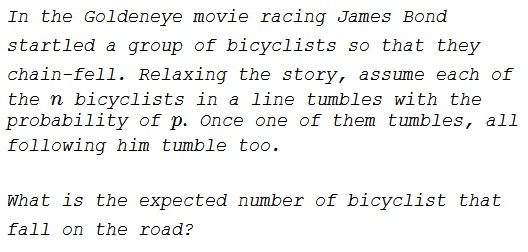Training Bicyclists on a Mountain Road
Problem

Solution 1
Let $q=1-p$ be the probability that a bicyclist won't tumble on his own. Then the probability that the bicyclist number $k$ (counting from the head of the line) does not fall equals $q^k.$
Let $I_{k}$ be the indicator function for the event that the bicyclist number $k$ tumbles down:
$I_k=\begin{cases} 1, & \text{if the }k^{th}\text{ bicyclist tumbles}\\ 0, & \text{otherwise} \end{cases}$
Then $P(I_k=0)=q^k,$ so that $P(I_k=1)=1-q^k$ and $\mathbb{E}(I_k)=1-q^k.$
We are interested in the expected number of the bicyclists that eventually tumble, $\mathbb{E}(n):$
$\displaystyle\begin{align}\mathbb{E}(n)&=\sum_{k=1}^n\mathbb{E}(I_k)=\sum_{k=1}^n(1-q^k)\\ &=n-q\frac{1-q^n}{1-q}=n-\frac{1-p}{p}(1-(1-p)^n). \end{align}$
Solution 2
$n$ tumble with probability $p$ (after the first does).
$n-1$ tumble with probability $p(1-p)$ (in case the second one tumbles).
$n-2$ tumble with probability $p(1-p)^2,$ and so on.
$1$ tumbles with probability $p(1-p)^{n-1}.$ Summing up
$\displaystyle \sum_{i=0}^{n-1}p(n-i)(1-p)^i=\frac{-1+(1-p)^{n+1}+p+np}{p}.$
Solution 3
The probability that cyclist $i$ is the first one to fall is equal to the probability that the previous $i-1$ cyclist did not fall, $(1-p)^{i-1}$ multiplied by the individual probability of falling $p$
$P_i = p(1-p)^{i-1}$
If cyclist $i$ falls then the remaining $n-i$ clyclist fall too for a total of $x_i = n+1-i.$ The expected value of $x$ is then equal to
$\displaystyle E(x) = \sum\limits_{i=1}^{n}P_i x_i$
Substitute and split the sum
$\displaystyle \begin{align} E(x) &= \sum\limits_{i=1}^{n} p(1-p)^{i-1} (n+1-i)\\ &=\frac{p}{1-p} [(n+1)\sum\limits_{i=1}^{n} (1-p)^{i} -\sum\limits_{i=1}^{n} i(1-p)^{i}] \end{align}$
Now we use the following results
$\displaystyle \sum\limits_{i=1}^{n} a^{i} = \frac{a(1-a^n)}{1-a} $
$\displaystyle \sum\limits_{i=1}^{n} ia^{i} = \frac{a(1-a^n)}{(1-a)^2}-\frac{n(1-a^{n+1})}{1-a} $
$\displaystyle E(x) =\frac{p}{1-p} [(n+1)\frac{(1-p)(1-(1-p)^n)}{1-(1-p)} -\frac{(1-p)(1-(1-p)^n)}{(1-(1-p))^2}+\frac{n(1-(1-p)^{n+1})}{1-(1-p)}]$
which yields
$\displaystyle E(x) =n- \frac{1-p}{p}(1-(1-p)^n)$
Acknowledgment
This is a paraphrase of problem 65352 from a Russian problem collection. Solution 2 is by N. N. Taleb; Solution 3 is by Alejandro Rodríguez.
|Contact| |Front page| |Contents| |Probability|
Copyright © 1996-2018 Alexander Bogomolny71534689
